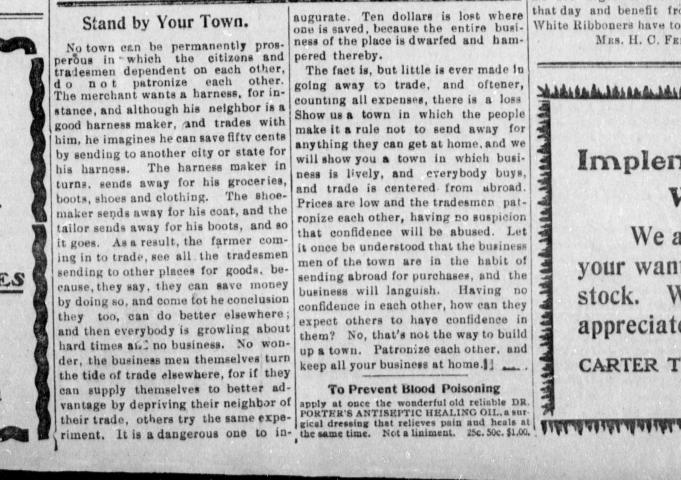|
Moderated by NW Okie! |
Volume 16 , Issue 22014Weekly eZine: (366 subscribers)Subscribe | Unsubscribe Using Desktop... |
1914 - Stand By Your Town

In that same 8 january 1914, The Beaver Herald, there was another article entitled, "Stand By Your Town," which they were proclaiming that, "No town can be permanently prosperous in which the citizens and tradesmen dependent one ash other, do not patronize each other."
The merchant wanted a harness, for instance, and although his neighbor was a good harness maker, and trades with him he imagined he can save fifty cents by sending to another city or state for his harness. The harness maker in turn, sends away for his groceries, boots, shoes and clothing. The shoemaker sends away for his coat, and the tailor sends away for his boots, and so it goes.
As a result, the farmer coming in to trade, see all the tradesmen sending to other places for goods, because, they say, they can save money by doing so, and come to the conclusion they too can do better elsewhere; and then everybody is growling about hard times and no business.
Does this sound familiar today in the 21st century?
The article goes on to state there is no wonder the business men themselves turn the tide of trade elsewhere, if they can supply themselves to better advantage by depriving their neighbor of their trade, others tried the same experiment. It was a dangerous one to inaugurate.Ten dollars was last where one is saved, because the entire business of the place was dwarfed and hampered.
The fact was back then, but little was ever made in going away to trade, and oftener, counting all expenses, there was a loss. They were asking those of the town in which the people make it a rule not to send away for anything they can get at home, and they would show you a town in which business was lively, and everybody bought and trade was centered from abroad.
Prices were low and the tradesmen patronized each other, having no suspicion that confidence would be abused. Let it once be understood that the business men of the town were in the habit of sending abroad for purchases, and the business would languish. Having no confidence one ash other, how could (can) they expect others to have confidence in them?
That was not the way to build up a town. Patronize each other, and keep all your business at home. Maybe that is how they saw it back in 1914, but that does not mean that would work today in the 21st century, though.
| View or Add Comments (0 Comments)
| Receive
updates ( subscribers) |
Unsubscribe
| © . Linda Mcgill Wagner - began © 1999 Contact Me | |
